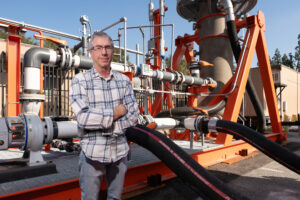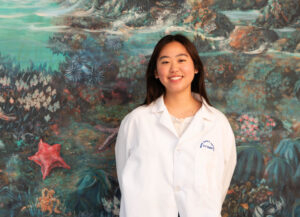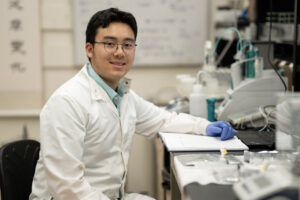The Berelson Lab leads ocean carbon capture research at USC
In an effort to address climate change, researchers are developing novel methods to combat the rising levels of carbon dioxide (CO2) in our atmosphere. Exploring ocean sequestration – a naturally-occurring phenomenon in which the ocean captures and stores CO2 – is one of them. Here at USC Dornsife, Paxson H. Offield Professor in Coastal and Marine Systems Will Berelson and his laboratory are spearheading these efforts.
As part of a multi-phase project, the lab constructed custom equipment at USC’s University Park Campus to test the process of capturing carbon and sequestering it in ocean water under tightly controlled testing conditions. Here’s a snapshot of how researchers in the Berelson lab are exploring the potential of ocean-inspired carbon capture methods:

As part of of the 2023-2025 cohort of USC Wrigley Institute for Environmental and Sustainability’s Faculty Innovation Award winners, Will Berelson‘s research examines the acceleration of natural ocean processes that neutralize rising Co2 levels and how these methods may affect marine ecosystems. The study is part of a collaboration with CalTech to develop carbon capture technology that can be used on cargo ships and other vessels that burn diesel fuel, which collectively contribute to about 3% of annual global CO2 emissions.
Read more about Berelson’s research >>

2023 Wrigley Institute Graduate Fellow Rucha Wani, a PhD student in the Ocean Sciences Program, studies a carbon capture technology known as accelerated weathering of limestone (AWL) to counteract the effects of ocean acidification, which is caused by the absorption of CO2 from the atmosphere.
Read more about Wani’s research >
 USC Environmental Studies major and Zinsmeyer Summer Research Program student Esther Lim works closely with Wani to learn how bicarbonate rich seawater, a dissolved carbon compound that is the product of ALW, will transform and affect ocean ecosystems. Insights from their experiments will help inform large-scale deployment strategies of ocean carbon capture methods.
USC Environmental Studies major and Zinsmeyer Summer Research Program student Esther Lim works closely with Wani to learn how bicarbonate rich seawater, a dissolved carbon compound that is the product of ALW, will transform and affect ocean ecosystems. Insights from their experiments will help inform large-scale deployment strategies of ocean carbon capture methods.
Read more about Lim’s research >

Wrigley Institute Research Experience for Undergraduates (REU) student Isaac Xie studies how a mineral known as olivine can mix with ocean sediment to raise the alkalinity of seawater and increase the ocean’s capacity for carbon sequestration.
Read more about Xie’s research >>
Given the promising results from various experiments thus far, the next step of the Berelson Lab’s carbon capture research will be underway soon. Keep an eye out for more exciting developments!
